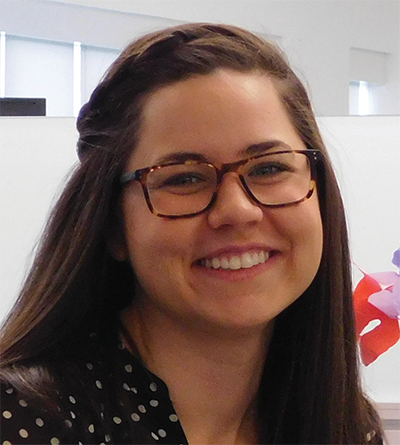From art to proteomics: a path to science
Jenn Abelin is now a group leader at working toward developing personalized cancer vaccines, but growing up in Connecticut, she didn’t want to do science at all. She wanted to do art.
 Jenn Abelin’s lab generates data to help decode rules for how human leukocyte antigens present peptides.
Jenn Abelin’s lab generates data to help decode rules for how human leukocyte antigens present peptides.
“In high school,” she said, “most of the classes I took were writing, reading, art and math.”
Looking back on these choices, she sees an emerging interest in recognizing patterns. But she got her initial push toward science from her grandmother, who encouraged her to study something more practical than art.
She picked a random class at Guilford College about ancient medicine; that set off a chain of events and introduced her to many role models and mentors in science who encouraged her. She took organic chemistry taught by her undergraduate advisor Anne Glenn and loved the idea that just memorizing facts and spitting them back out wasn’t going to cut it. She saw there was real creative thinking and problem solving in science.
Before she knew it, she was majoring in biology and chemistry and doing proteomics research. She went on to pursue her Ph.D. at the University of Virginia mentored by and Jeffrey Shabanowitz, studying cancer with mass spectrometry-based proteomics. As a postdoctoral researcher at the Broad Institute, she was mentored by , and .
Now as a leader of a research lab doing groundbreaking work, Abelin says the best part of her job is getting to work on basic science that directly impacts people’s lives for the better.
Outside the lab, she believes it’s important to share her path. She wants young people to know that to be a successful and happy scientist, you don’t have to start as a genius baby doing calculus in your high chair. When she was a kid, she was “likely eating dirt,” she said, and doing other average kid stuff.
“I hope to be able to do mentoring in the future,” she said. “I’ve had the most amazing mentors during my career, and I hope to continue that.”
Abelin is one of four young investigators chosen by the editorial team of the journal Molecular & Cellular Proteomics to present their research at the ASBMB annual meeting.
Using mass spectrometry to develop personalized cancer immunotherapies
Jenn Abelin’s work focuses on generating data that helps predict peptide antigens presented by cancer cells, with the goal of creating personalized immunotherapies to help patients’ immune systems fight their cancers.
To do this, researchers must understand how cells’ human leukocyte antigen, or HLA, complexes present antigens from inside the cell. The HLA complex presents to the immune system peptides from many proteins within cells. If those presented are self-peptides, the immune system does not react. However, if the peptides are from something non-self, like a virus, the immune system attacks the cell. Personalized cancer vaccines work by training the immune system to attack the cells presenting peptides that are unique to cancer. For this to work, however, we must know what these peptides are.
Humans have six HLA proteins that function in different combinations in each of us, and each of these combinations favors different peptides. Using high-throughput mass spectroscopy, Abelin’s group has generated data to help decode a set of rules for how HLAs present peptides. With these data, Neon Therapeutics can predict with high accuracy what neoantigens may be presented by tumor cells and can be used as targets for personalized immunotherapy.
Enjoy reading ASBMB Today?
Become a member to receive the print edition four times a year and the digital edition monthly.
Learn moreGet the latest from ASBMB Today
Enter your email address, and we’ll send you a weekly email with recent articles, interviews and more.
Latest in People
People highlights or most popular articles

Cedeño–Rosario and Kaweesa win research award
The award honors outstanding early-career scientists studying cancer, infectious disease and basic science.

ASBMB names 2026 award winners
Check out their lectures at the annual meeting in March in the Washington, D.C., metro area.

Peer through a window to the future of science
Aaron Hoskins of the University of Wisconsin–Madison and Sandra Gabelli of Merck, co-chairs of the 2026 ASBMB annual meeting, to be held March 7–10, explain how this gathering will inspire new ideas and drive progress in molecular life sciences.

Castiglione and Ingolia win Keck Foundation grants
They will receive at least $1 million of funding to study the biological mechanisms that underly birds' longevity and sequence–function relationships of intrinsically disordered proteins.

How undergrad research catalyzes scientific careers
Undergraduate research doesn’t just teach lab skills, it transforms scientists. For Antonio Rivera and Julissa Cruz–Bautista, joining a lab became a turning point, fostering critical thinking, persistence and research identity.

Simcox and Gisriel receive mentoring award
They were honored for contributing their time, knowledge, energy and enthusiasm to mentoring postdocs in their labs.

